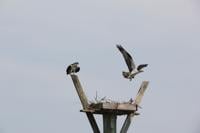VIRGINIA– The Menhaden Fisheries Coalition has responded to the Chesapeake Bay Foundation's claims of industrial menhaden fishing contributing to a "total population collapse" of osprey on Virginia's Eastern Shore.
This comes after a May survey by the College of William and Mary's Center for Conservation Biology reported a 90% nesting osprey population decline in recent decades.
The Chesapeake Bay Foundation (CBF) cites prey scarcity as the main factor, pointing the finger at Omega Protein's annual 100 million pound-plus menhaden harvests.
Omega Protein denies claims it impacted osprey populations, saying it has cooperated with menhaden stock assessments and monitoring for decades.
"Constant oversight of our fishing practices and the status of the stock provides assurance that menhaden will be available for generations to come," the company's website says.
The Menhaden Fisheries Coalition (MFC) says Omega Protein's supplier, Oceans Harvest, not fishing the region during the survey's timeframe.
"Rather than contributing to constructive discussion, [Chesapeake Bay Foundation] amplifies unsupported claims, vilifying hardworking, blue-collar fishermen in the Atlantic menhaden fishery," a press release from MFC states.
The Coalition says CBF mischaracterized the survey's findings and omitted important context, including information from the U.S. Geological Survey (USGS).
USGS confirmed the osprey population decline in a letter to the U.S. House Committee on Natural Resources, but said the survey did not explore all possible causes. Authors suggested other potential factors in the decline as, "prey abundance, access to prey, exposure to contaminants, incidence of disease, increased predation risk, parental condition, brood size, and adverse weather conditions."
The group also cites a lack of research on the impact of avian influenza on osprey populations, although past disease events impacting other Chesapeake Bay waterfowl have not resulted in high osprey mortality, according to the letter.
While more research is needed into the osprey population collapse, the Atlantic States Marine Fisheries Commission's latest stock assessment, currently under peer review, could provide further insight into prey availability in the Chesapeake Bay.



